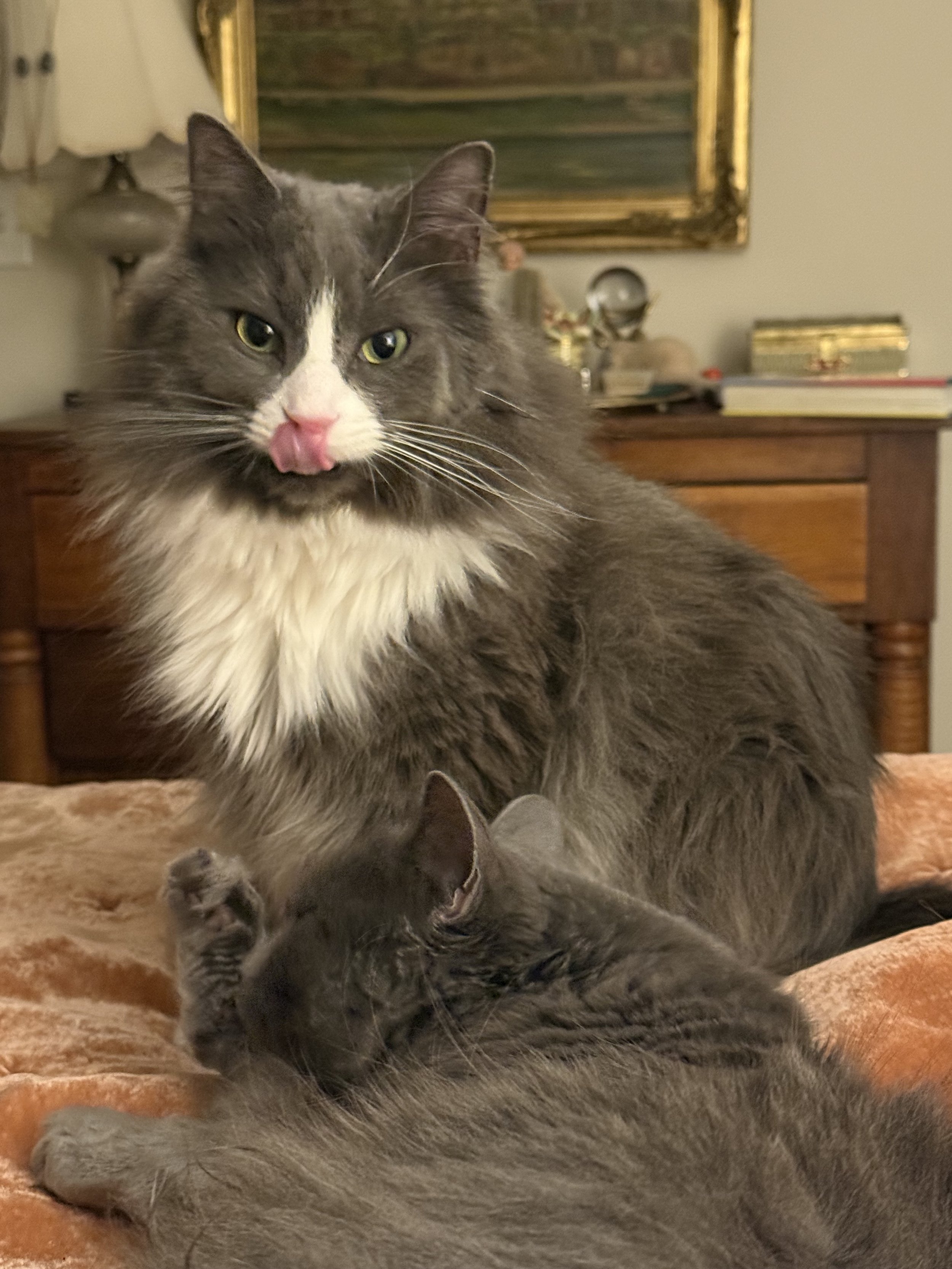Margo’s Got Money Troubles v. Someone Like Us
The 2025 Tournament of Books, presented by Field Notes, is an annual battle royale among 16 of the best novels of the previous year.
MARCH 18 • OPENING ROUND
Margo’s Got Money Troubles
v. Someone Like Us
Judged by Michael David Lukas
Michael David Lukas is the author of The Oracle of Stamboul and The Last Watchman of Old Cairo. Translated into more than a dozen languages, his work has received the Sami Rohr Prize, the National Jewish Book Award, the Prix Interallié for Foreign Fiction, and the ALA’s Sophie Brody Medal. His nonfiction has appeared in the New York Times Magazine, the Wall Street Journal, Slate, National Geographic Traveler, and the Georgia Review. He lives in Oakland and teaches at San Francisco State University. Known connections to this year’s contenders: “I'm friends with RIta Bullwinkel.” / michaeldavidlukas.com
I went into my Tournament of Books judging experience pretty much cold. Aside from the covers and a vague familiarity with Dinaw Mengestu’s work from his essays in the New Yorker, I had no idea what I was getting into. I didn’t read any of the reviews or the jacket copy. I didn’t even look at the blurbs. I mention this not because I think this manner of reading is especially laudatory (or even notable), but because both of the books surprised me in entirely different ways.
Margo’s Got Money Troubles starts off with the Margo of the present looking back on her younger self. It’s a relatively typical conceit, except that in this book the present-Margo is rendered in the first person and the past-Margo is (usually) rendered in third person. Margo performs a series of narrative somersaults to explain why the point of view is fractured like this, including an exchange between her freshman English professor and an annoying fellow student named Derek. But the exchange was frankly a bit difficult to follow, given that the professor is also the father of Margo’s child. A fact we learn halfway through the book’s first page:
Margo’s baby shower was hosted by the owner of the restaurant where she worked, Tessa, who thought it would be funny if the cake was shaped like a big dick, maybe because Margo wasn’t married, was nineteen, and couldn’t even drink, or because it was her professor who’d knocked her up.
The first 60 or pages of the novel involve Margo caring for her newborn and making understandable but not very well thought out decisions as she tries to figure out how to make ends meet, all the while quipping about the utter brokenness of the childcare system and the utter shittiness of the supposedly responsible adults who one would think might step in to help her out. Around the time I started to wonder where the plot was headed, Margo decides—in part through the intervention of her former pro-wrestler dad—to try her luck posting nudes and rating dick pics on OnlyFans.
It's very much to the credit of the author that this plot twist not only works but also fulfills that elusive MFA dictum of being surprising but inevitable. Aside from one or two especially maudlin twists near the end, the remainder of the book is engaging, warm, and full of life. As the plot progressed, I found myself increasingly connected to Margo, her father, her roommate, and even a few of the “fans” in her DMs. The book isn’t particularly deep—there’s virtually no subtext, and the plot only skims the surface of the societal and philosophical issues it engages with—but the prose is crisp and clear. The narrator is funny. And, most importantly, I cared. I wanted to keep reading. As the stakes ramped up near the end, I found myself making extra space to read, staying up late, or squeezing in a few last minutes before picking up my kids from school.
FROM OUR SPONSOR
If Margo’s Got Money Troubles is somewhat lacking in subtext and rumination, Someone Like Us more than makes up the difference. The story begins with the narrator, a wayward expat journalist named Mamush, inexplicably (intentionally?) missing his flight from Paris back to Washington, DC, then booking a flight to Chicago instead. Or maybe it begins with the death of Samuel, the uncle-like figure who Mamush knows to be his father, though “neither he nor my mother had ever expected me to treat him as such.” Or maybe it begins with a kind of love story, the story of desire and opportunity and regret that brought Mamush’s mother and Samuel together long ago in Ethiopia, the story that brought them both to Chicago and eventually Washington, the story that brought Mamush into this world.
Wherever you might say its story begins, Someone Like Us is a book about grief and yearning and the slippery nature of truth, a book about how our sense of self effaces who we are, how the worlds we build from stories shape the way we move through the world. The prose is exquisite, with deceptively simple sentences building to paragraphs that emerge with clarity always just slipping from our grasp. Take, for example, this one, from about a quarter of the way through the book:
I asked the cab driver at the airport in Chicago if he could take me to the courthouse downtown. When he asked me which one, I handed him a photograph of my mother and me in front of a six-story red brick building with a row of flags in the front. In the photograph my mother and I looked to be laughing and not just smiling on demand, a seemingly minor but potentially important detail if you believed that stories that started in a happy place had a better chance of ending in one.
As the book progresses, we spiral deeper and deeper into Mamush’s wounds and secrets, deeper into Samuel’s lies and self-effacement, deeper into vast expanses of silence, into overlapping layers of memory and regret. By the end, the plot is like a piece of paper that’s been folded so many times it no longer exists. Like a kind of narrative black hole that loops back around to the beginning. There are some revelations along the way, but the biggest of all is that there is no epiphany, no big twist to the plot, nothing you would call resolution. When I finished the book I felt like I had just woken up from a rich and deeply-moving dream, the details of which were already entirely gone.
All of which is to say, Someone Like Us is a profoundly literary novel. There are photographs of semi-ruined buildings, darkened windows, and perfectly cut apples sprinkled throughout. The dialogue is teeming with subtext. The characters are yearning for connection, but unable to see the people right in front of them. It’s a book full of pain and longing, mysterious illnesses and furtive self-destructive behaviors. The kind of novel you would be proud to read in any coffee shop or graduate student lounge.
At a different point in my life, I’m pretty sure I would choose Someone Like Us without thinking twice. The book is as finely crafted as any I’ve read in a long time. The characters are deep and complex, full of inconsistency and pathos. It made me think about the world in new ways. But I never really felt connected to Mamush. Not in the way I did with Margo. And, at this point in my life, I want a book that does more than make me think. I want a book that makes me feel, a book that makes me late to pick up my kids from school, a book that keeps me up late and stays with me after I’ve finished it. On all of these counts, Margo’s Got Money Troubles is the clear winner.
Advancing:
Margo’s Got Money Troubles
Match Commentary
with Meave Gallagher and Alana Mohamed
Meave Gallagher: Score one for the teen-mom sex worker. Also score one for me because I was immediately mad at Mamush for lying to his wife, and the prose was so dull, I couldn’t finish it. Judge Lukas and I are having a real mind-meld here—a book that makes you want to devour it is as worthy of praise as a “profoundly literary novel.”
Margo was such a treat. It’s a very book club book—can’t you imagine the Famous Book Club Ladies fighting over who gets to put her imprimatur on it? But that’s not a knock. It’s funny and a little weird, and I was very invested in Margo and her “Ionesco, but for sex farces on TikTok” collaborators, and her baby. (How did we end up with so many motherhood novels?) Though I can already picture all the comments about it being too Lit Lite for the vaunted Tournament of Books. (Do any of you put marshmallows in your hot cocoa?)
Do you think Judge Lukas made the case for Margo’s Got Money Troubles?
Alana Mohamed: I’m always a little agnostic about the book club book vs. literary novel conversation, but I love Judge Lukas’s reasoning for selecting Margo’s Got Money Troubles.
Meave: I don’t love it, but also three fourths of my book club put it in the suggestion spreadsheet, so…
Alana: I can see why! I particularly liked his bit about, “As the stakes ramped up near the end, I found myself making extra space to read, staying up late and squeezing in a few last minutes before picking up my kids from school.” So relatable!
Meave: Describing Someone Like Us as “the kind of novel you would be proud to read in any coffee shop or graduate student lounge” reminds me of those “compliments” The Book of Love kept getting in its matchup. Now, I do most of my reading on audiobooks lately—thanks, migraines—so no one is ogling my book covers. And the narration of Someone Like Us was exhausting, with those “deceptively simple sentences building to paragraphs that emerge with clarity always just slipping from our grasp” passing by me altogether. If Mamush didn’t seem to care about his story, how could I?
Alana: I enjoyed Someone Like Us and its slipperiness, but I found myself resisting Judge Lukas’s comment that Margo “isn’t particularly deep” because it “skims the surface” of the conditions that set up the novel. Isn’t there something to be said for a novel not needing to do these things if it’s capturing you in the way Margo captures Judge Lukas? Isn’t that bond kind of deep?
Meave: There’s the rest of the case for Margo that I was looking to be made, you clever woman.
Alana: Ha! In contrast, I didn’t quite buy that “photographs of semi-ruined buildings” and “pain and longing” are hallmarks of literary fiction. I’ll concede that it is a test of endurance, to borrow a backhanded compliment issued to Book of Love, but I kind of enjoyed that element for illustrating the feat that is narrating an immigrant origin story. It seems like Someone Like Us took the loss for its meandering and lack of closure, which I think is understandable when paired with the winsome Margo.
Meave: Margo offers you about a billion handholds, like a super-extra-beginner's climbing wall. You want mother issues? Father issues? Economic precarity? Young single motherhood? Family court? A primer on how to use one social media platform to drive traffic to another platform?
Alana: I do think there are similar handholds in Someone Like Us. Family issues, economic precarity, legal issues, fatherhood—they’re definitely there, and I found a lot of the writing around the pursuit of a happy immigrant family to be more emotionally resonant than Judge Lukas. But it seems like, given their treatment, he found these elements more philosophically and stylistically interesting than anything else.
Meave: Your description of Someone Like Us doesn’t sound like the book I read maybe a quarter of. I wonder if I’d been able to read it instead of listen to it, that would’ve made a difference; upon further reflection, can I blame the narrator’s flat tone for failing to convey any emotion at all? If I had heard Mamush’s conflicted feelings instead of anhedonia from the start, well…
Alana: To be fair, I think Mamush is quite passive and given to reverie/reflection in a way that can be trying, especially in the beginning. The divergences around home, family, and belonging are only enjoyable if you feel you have enough purchase in the story to be invested. Margo’s Got Money Troubles kicks off with a playfulness that charms from the start, I think.
Meave: Being an OF creator who has to use social media to promote herself was a place I wish Margo had gotten deeper. I see so many economically precarious cis and trans women trying to support themselves by promoting their OF or Fansly accounts on social media, I don’t know how anyone manages to stand out. But as Judge Lukas notes, this is a perfect “surprising but inevitable” story, so Thorpe gives Margo a wrestling producer father. If there’s anyone who knows how to find and grow an audience with spectacle, it’s wrestlers. (Although Vince McMahon is history’s greatest monster.)
Alana: I wonder if a strength of Margo’s Got Money Troubles is its scope and focus? It doesn’t permit itself digressions, like a deeper dive into the OF creator economy, but this quality allows for the stakes to ramp up in a way that feels urgent. Someone Like Us could have been a much more tightly plotted story, but ends up becoming “a kind of narrative black hole that loops back around to the beginning” for its indulgences in memory, media, etc.
I can’t blame Judge Lukas for how he voted. The digressions in Someone Like Us are either a hindrance or a portal, and I think it’s got a specific audience!
Meave: Well, now I wonder if I should try again with Someone Like Us—this conversation makes me concerned that I gave a good book short shrift. I still agree with the judge, I understand his arguments, his judgment says to me that he read both novels—an odd pairing, right?—with an open mind and really considered his criteria for choosing the winner between the two, and I’m terribly pleased with the outcome.
Alana: I’d encourage you to give Someone Like Us another go if you have it in you. It lands in a surprising place and I was sobbing by the end. Cheers to Margo for advancing, though! I thought they were both excellent books.
Until next time!
Kevin Guilfoile: Thank you Meave and Alana! And with today’s decision, that’s the end of the opening round, which means it’s time for our first Zombie update. For those who are new to the Rooster, before the Tournament started we asked readers to vote for their favorite book on the shortlist. After the semifinals, when we’ve whittled the field down to just a pair, the two books who have the most votes from among the books that have been eliminated will come back and do battle with our presumptive finalists. Starting today we will let you know who is leading in the Zombie voting among the books that have been eliminated thus far.
Looking at the votes, I think we have a Rooster first. Both of the current Zombie leaders were eliminated in the play-in round. Obviously these results could change as more books are knocked out of the competition, but if the Zombie Round were held today, All Fours and The Wedding People would be our Boomeranging Babadooks.
This means we must now say goodbye for good to The Book Censor’s Library, The Book of Love, Rejection, Great Expectations, Orbital, Colored Television, The Book of George, and Someone Like Us.
Today’s mascot




Nominated by Alison, this is Gatsby, known far and wide for his rocket-ship nose and luxurious pink tongue (he is, in fact, a Rolling Stones fan). Like his namesake, he is elegant, social, and tends to gaze for hours into the distance from the bedroom window. (A green light? A squirrel?) He has a bad habit of nibbling at the edges of paperback books and tends to lounge splendidly in the center of a crowd of his adoring fans.
As a long-time Percival Everett fan, Gatsby is pulling for James in this year's Tournament. He would, however, like to point out that Martyr! is a personal favorite.
He is pictured here lording over his brother, Nick Carraway.
If you’re interested in nominating a pet as a mascot for this year’s Tournament of Books, contact us for more details. (Please note, this is a paid program.)

